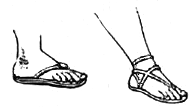Sandals in the Bible
By Mark Morgan | Jeremiah

For most of us, shoes are surprisingly important. I say ‘surprisingly’ because most of us would think them less important than various other items of clothing. Yet badly-fitting shoes, or shoes that do not protect against stones or thorns quickly leave us unable to continue walking. An ill-fitting shirt causes much less trouble!
While researching what footwear Jeremiah may have worn, I came across some interesting references to shoes or sandals in the Bible. Writing biblical fiction has frequently led me to fascinating information and this was no exception.
King David wrote two Psalms that describe Moab as God’s washbasin; Edom as the place over which he ‘casts his shoe’.[1] Some suggest that this relegates both Moab and Edom to the position of servants, since only servants would help with cleaning feet dirtied by travel. You may remember Jesus’ cleaning of his disciples’ feet to teach them the lesson that they should all be willing to serve each other.[2] It seems that Peter objected to Jesus doing this because he thought that he was not worthy to have Jesus serving him in this way. John the Baptist had earlier said that he was not worthy even to carry Jesus’ sandals.[3] If servants really did take a visitor’s sandals, we could understand John to mean that he wasn’t a sufficiently important servant to take Jesus’ sandals.
In the same time as Jeremiah, God told Ezekiel that his wife would die, and that when she did, he must not mourn. Instead, he was to behave ordinarily, putting his turban on his head and sandals on his feet.[4] This was to be a lesson to the watching audience when Ezekiel explained that they would have to do as he had done when the inhabitants of Jerusalem were taken into captivity.[5]
As a family, we frequently visit India, and in most of the houses we visit, people are very particular to remove their sandals when they enter. Sandals are considered unclean. This attitude is brought home to us at the burning bush when God told Moses to take off his sandals because the place where he was standing was holy.[6] Sandals would profane that holy place whereas bare feet would not – curious given how dirty feet become wearing sandals. Just to confirm this message, Joshua was also told the same thing at a different time.[7]
Another interesting reference to sandals was when punishing a man who would not cooperate with a leviratic marriage. In ancient times, if a man died having a wife but no children, his brother was responsible for marrying the widow and producing a child who would inherit the dead man’s estate.[8] This is called leviratic marriage. A man could refuse to take his brother’s wife, but if he did so, it earned him contempt, shown in an unexpected way: the widow was to pull off his sandal, spit in his face and announce that that is what should happen to a man who refused to build up his brother’s family.[9] The references to sandals in the book of Ruth seem to be either related or corrupted procedures.[10]
This article is one of a series of articles on Jeremiah published as back-up material for the Bible-based fiction series Terror on Every Side!
[ More information | Purchase ]
Subscribe to our newsletter
Enjoyed this article? Articles on this site summarise the research we do in writing our Bible-based fiction. If you enjoy reading real Bible-based fiction or are willing to give it a try, enter your name and email address in the fields below, then click "Subscribe". You'll get a new micro-tale, or an informative article every week, as well as occasional special offers from Bible Tales Online. You can unsubscribe at any time.
See our Privacy Policy.
Notes